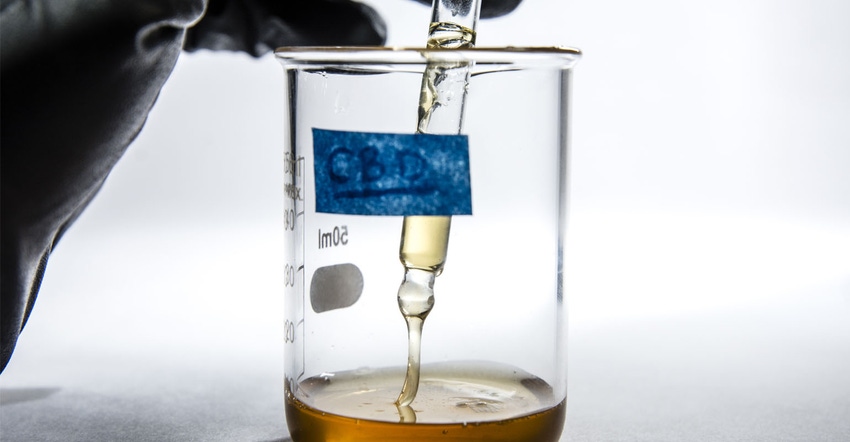DEA places CBD drug in Schedule V of CSA
DEA distinguished Epidiolex, a Schedule V controlled substance, from other CBD products, underscoring the agency’s view that many CBD products on the market are Schedule I controlled substances.

The Drug Enforcement Administration (DEA) is placing an FDA-approved CBD drug, Epidiolex, into Schedule V of the Controlled Substances Act (CSA).
DEA announced the decision three months after FDA approved Epidiolex for the treatment of seizures associated with Lennox-Gastaut syndrome and Dravet syndrome, in patients two years of age and older.
“This is the first FDA-approved drug made from the cannabis plant,” DEA stated in a Federal Register notice scheduled to be published Friday. “Now that Epidiolex has been approved by the FDA, it has a currently accepted medical use in treatment in the United States for purposes of the CSA. Accordingly, Epidiolex no longer meets the criteria for placement in Schedule I of the CSA.”
FDA Commissioner Scott Gottlieb, M.D., weighed in on the development.
“The FDA is committed to advancing scientific research and drug development programs that properly evaluate the active ingredients contained in marijuana,” he said in a statement. “Adequate and well-controlled clinical studies supported Epidiolex’s approval, so prescribers can have confidence in the drug’s uniform strength and consistent delivery that support appropriate dosing needed for treating patients with these complex and serious epilepsy syndromes. The FDA will continue to support rigorous scientific research on the potential medical uses of marijuana-derived products and stand ready to work with product developers who are interested in bringing patients safe and effective, high quality products.”
U.S. marketers of CBD in dietary supplements are hopeful that a 2018 farm bill pending in Congress will clarify hemp-derived products—including CBD—are not controlled substances subject to DEA’s jurisdiction. And many companies selling CBD in dietary supplements have maintained their activities today are lawful under agricultural research pilot programs authorized under the 2014 farm bill. Consequently, they have argued, their CBD products are not Schedule I controlled substances.
But for now, DEA remains an obstacle to the burgeoning industry.
In the Federal Register notice, DEA distinguished Epidiolex, a Schedule V controlled substance, from other CBD products, underscoring the agency’s view that many CBD products on the market are Schedule I controlled substances with no acceptable medical use alongside other illegal drugs such as ecstasy, cocaine and heroin.
“As further indicated, any material, compound, mixture, or preparation other than Epidiolex that falls within the CSA definition of marijuana set forth in 21 U.S.C. 802(16), including any non-FDA-approved CBD extract that falls within such definition, remains a Schedule I controlled substance under the CSA,” the Federal Register notice stated. “Thus, persons who handle such items will continue to be subject to the requirements of the CSA and DEA regulations relating to Schedule I controlled substances.”
"Marijuana and CBD derived from marijuana remain against the law," DEA added in a press release, "except for the limited circumstances that it has been determined there is a medically approved benefit."
DEA’s announcement moved GW Pharmaceuticals plc and its U.S. subsidiary, Greenwich Biosciences, one step closer to marketing Epidiolex. London-based GW said it planned to make the drug available within the next six weeks, with the availability of Epidiolex primarily hinging on the time needed to obtain Schedule V licenses for the U.S. distributor and importer.
“We are pleased that the DEA has placed Epidiolex in the lowest restriction Schedule, because it will help ensure that patients with LGS and Dravet syndrome, two of the most debilitating forms of epilepsy, can access this important new treatment option through their physicians,” said Justin Gover, GW’s chief executive officer, in a statement. “With this final step in the regulatory process completed, we are working hard to make Epidiolex available within the next six weeks as we know there is excitement for a standardized version of cannabidiol that has undergone the rigor of controlled clinical trials and been approved by the FDA.”
GW plans to charge patients $32,500 per year for Epidiolex, a price the company said in an August 2018 regulatory filing "is in line with other branded anti-epileptic drugs used to treat these conditions."
Out-of-pocket costs for patients taking the CBD medicine could range from $5 to $10 a month for those in state Medicaid programs to as high as $200 a month for some private insurance plans, Julian Gangolli, president of the company’s North America unit, said on a conference call in August, the Wall Street Journal reported.
Editor's Note: Looking for an in-depth look at the current landscape of CBD and strategies to mature it as an industry? Join us for the CBD and Hemp Extracts: How Do We Move Forward? workshop on Wednesday, Nov. 7, at SupplySide West 2018. This workshop is underwritten by CFH, CV Sciences, Elixinol, KGK Science, Neptune Wellness Solutions and RAD Extraction & Processing.
About the Author(s)
You May Also Like






.png?width=800&auto=webp&quality=80&disable=upscale)